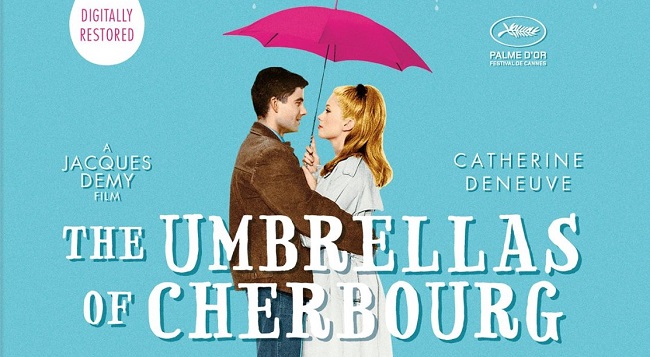
The Umbrellas Of Cherbourg Review
 There are some films Blu-ray, or at least HDMI were made for. It’s not necessarily for big budget sci-fi films or modern blockbusters. One of the best films to see is the restored Blu-ray of Gentlemen Prefer Blondes (1953). The Umbrellas of Cherbourg (1964) (Les Parapluies de Cherbourg) is another. The cinematographic palette of Cherbourg is stunning. One of the supporting documentaries on the disc is a restoration documentary showing how each glitch and imperfection is digitally re-touched even from the restoration that had been carried out in the 1990s.
There are some films Blu-ray, or at least HDMI were made for. It’s not necessarily for big budget sci-fi films or modern blockbusters. One of the best films to see is the restored Blu-ray of Gentlemen Prefer Blondes (1953). The Umbrellas of Cherbourg (1964) (Les Parapluies de Cherbourg) is another. The cinematographic palette of Cherbourg is stunning. One of the supporting documentaries on the disc is a restoration documentary showing how each glitch and imperfection is digitally re-touched even from the restoration that had been carried out in the 1990s.
The Umbrellas of Cherbourg is a musical, but not a traditional musical in the manner of a Hollywood one – more of this later. The story opens in the drab and wet Normandy town of Cherbourg. Genevieve is a pretty young teenager who works with her mother in her mother’s umbrella shop. Genevieve is in love with Guy, a local mechanic. Guy, however, Guy has been given his call-up papers to go and fight in Algiers. Naturally young Genevieve is sad that Guy has been given his call-up. Her mother doesn’t approve of her relationship with Guy and tries to set her up with a rich widower (her mother is a typically aspiring petit-bourgeoisie and does not approve of her daughter marrying a mechanic). Although Monsieur Cassard is nice she just ain’t that into him. Guy and Genevieve consummate their relationship before he goes but falls pregnant. Naturally she is sad at their departure and over time in the drudgery of life she marries another.
The setting and the story is naturalistic but the music is at times unsettling. The film is made with a realistic story with naturally drawn characters and is shot in a natural way (aside from the colours) – the only unnaturalistic scene is the one in which Guy and Genevieve saunter down an alley but seem to be gliding on a conveyer. It takes a while for the viewer to accept this story through music, presented like a modern opera. This is not West Side Story (1961), Leonard Bernstein’s musical a musical for the modern youth with dance numbers too where even the fights between the Jets and the Sharks is choreographed. There are no such musical numbers here, instead music in the place of words – in other words an opera. The lyrics are bizarrely naturalistic with Guy, the mechanic singing to a client about oil and petrol, that “the engine pinks when cold, but that’s normal…” After a while the viewer becomes more engaged with the story and accepts the music written by Michel Legrand who would go on to write the classic score to French cinema, Un home, est une femme (1966) (everyone knows it, even if they don’t know where from) with a typically French jazzy score. But this is nothing like a Hollywood musical, something Demy was very much influenced by. In Hollywood no musical would portray prostitutes, sing about the throwing of a grenade, deal with sex or un-married pregnancy. This was new. France, of course was a part of the social revolution and in many ways was breaking new ground way ahead of Britain and America (already in Louis Malle’s Les Amants [The Lovers] we have a the man ‘go down’ on his lover).
The colours of the film are luminous and outstandingly rich. Moving away from the flat and at times nourish black and whites of French cinema pre-1960s the colours of films by Jean-Luc Godard and Demy (and Michelangelo Antonioni in Italy) they are bright, unnaturalistic and seem more like a painter’s palette. The colours here vibrate with mauves, oranges, greens, reds, pink and electric blue, all very flat like a Matisse as Demy called it. Vibrating in the centre of the film is the legendry and young Catherine Deneuve. Although this was not her first film it did make her a household name in France. For her, the film is sandwiched between a film by Roger Vadim who tried to make her into a sex kitten and Bunuel’s Belle de Jour in which she plays the very private and cool prostitute. Here Deneuve is an innocent caught in a situation any teenager in a provincial town could find herself. Jacques Demy and Deneuve would make a total of four films together, including the similar Les Demoiselles des Rochefort (1967). Today it is through the films of Baz Luhrmann and François Ozon we see the legacy of Demy and Cherbourg.
The extras are plentiful including an almost hour long documentary about the making of The Umbrellas of Cherbourg and another equally lengthy documentary on Jacques Demy, as well as the aforementioned restoration an introduction to French film fan Geoff Andrew, a tribute by the more contemporary French actress Virginie Ledoyen, an audio interview with Deneuve and a stills gallery and trailers. Interestingly one of the trailers doesn’t give much away about the film and instead talks of the film in the context of its time and the war in Algeria. Not seen at the time as a ground breaking or important film alongside the likes of Godard or Truffaut it stands out as an important apolitical link between French society and modern cinema.
Chris Hick
